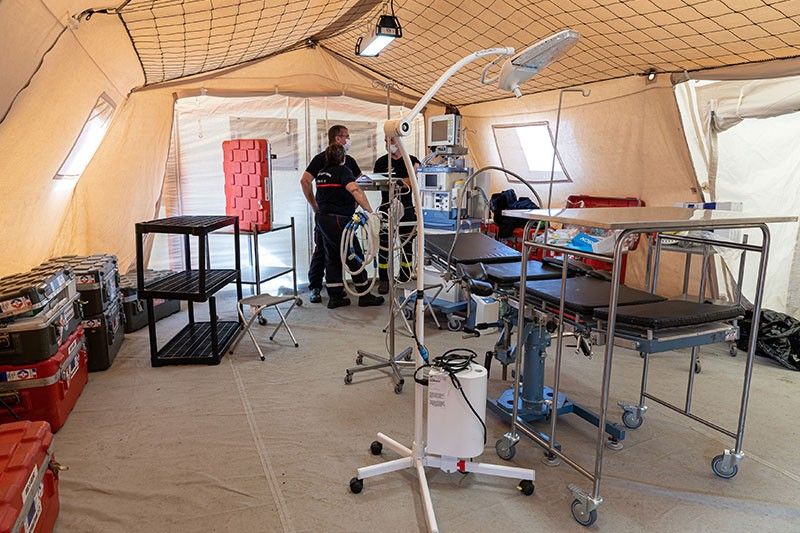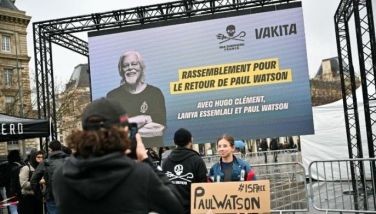UN chief: COVID-19 signals need for global approach to problems

UNITED NATIONS, United States — UN Secretary-General Antonio Guterres on Thursday called on the world to strengthen multilateral cooperation, saying a global approach has been the key to addressing the COVID-19 pandemic.
Speaking on the eve of the 75th anniversary of the United Nations Charter, he said the world is in turmoil, struggling with the coronavirus and climate change, as well as widespread racial injustice and increasing inequality — all best solved by a renewed sense of multilateralism.
"We cannot go back to the way it was and simply recreate the systems that have aggravated the crisis," he told reporters.
"We absolutely must come together to reimagine and reinvent the world we share.
"We need an effective multilateralism that can function as an instrument of global governance where it is needed."
Guterres said the United Nations proved its worth in reacting to coronavirus, shipping 250 million items of personal protective equipment to more than 130 countries, supporting children's education and the needs of families and caregivers.
The UN supply chain was also important in moving medical goods around the globe as COVID-19 spread, Guterres said.
And its support for developing a vaccine, and his own effort in March to bring about ceasefires in various conflict zones to slow the virus's spread, underscore the value of the 75-year-old institution's multilateral approach, he said.
The UN charter was signed in San Francisco on June 26, 1945 at the end of World War II and entered into effect four months later.
Among people in many countries, the response to the pandemic has eroded their confidence in political establishments and institutions, Guterres said.
The pandemic has bared "severe and systemic inequalities," and world leaders need to acknowledge the value of global cooperation to address these and other, unpredictable crises, he said.
"As we mark Charter Day and look ahead, we must reimagine the way nations cooperate."
"We need to build back better with more sustainable, inclusive, gender-equal societies and economies."
Priorities indicated by the COVID-19 pandemic, he said, are ensuring universal access to healthcare, tightening bonds between people and nations, and rethinking the global economy to reduce inequality.
Guterres said he hoped that the five permanent members of the UN Security Council — the United States, China, Russia, France and Britain — would be able to meet in September to smooth over conflicts.
"Nothing replaces personal contact, personal diplomacy... that can generate empathy, consensus, common feeling to work together," Guterres said.
Follow this page for updates on a mysterious pneumonia outbreak that has struck dozens of people in China.
New Zealand Prime Minister Chris Hipkins says on Sunday that he had contracted COVID-19, testing positive at a key point in his flailing campaign for re-election.
Hipkins saYS on his official social media feed that he would need to isolate for up to five days -- less than two weeks before his country's general election.
The leader of the centre-left Labour Party said he started to experience cold symptoms on Saturday and had cancelled most of his weekend engagements. — AFP
The World Health Organization and US health authorities say Friday they are closely monitoring a new variant of COVID-19, although the potential impact of BA.2.86 is currently unknown.
The WHO classified the new variant as one under surveillance "due to the large number (more than 30) of spike gene mutations it carries", it wrote in a bulletin about the pandemic late Thursday.
So far, the variant has only been detected in Israel, Denmark and the United States. — AFP
The World Health Organization says on Friday that the number of new COVID-19 cases reported worldwide rose by 80% in the last month, days after designating a new "variant of interest".
The WHO declared in May that Covid is no longer a global health emergency, but has warned that the virus will continue to circulate and mutate, causing occasional spikes in infections, hospitalisations and deaths.
In its weekly update, the UN agency said that nations reported nearly 1.5 million new cases from July 10 to August 6, an 80% increase compared to the previous 28 days. — AFP
The head of US intelligence says that there was no evidence that the COVID-19 virus was created in the Chinese government's Wuhan research lab.
In a declassified report, the Office of the Director of National Intelligence (ODNI) says they had no information backing recent claims that three scientists at the lab were some of the very first infected with COVID-19 and may have created the virus themselves.
Drawing on intelligence collected by various member agencies of the US intelligence community (IC), the ODNI report says some scientists at the Wuhan lab had done genetic engineering of coronaviruses similar to COVID-19. — AFP
Boris Johnson deliberately misled MPs over Covid lockdown-breaking parties in Downing Street when he was prime minister, a UK parliament committee ruled on Thursday.
The cross-party Privileges Committee said Johnson, 58, would have been suspended as an MP for 90 days for "repeated contempts (of parliament) and for seeking to undermine the parliamentary process".
But he avoided any formal sanction by his peers in the House of Commons by resigning as an MP last week.
In his resignation statement last Friday, Johnson pre-empted publication of the committee's conclusions, claiming a political stitch-up, even though the body has a majority from his own party.
He was unrepentant again on Thursday, accusing the committee of being "anti-democratic... to bring about what is intended to be the final knife-thrust in a protracted political assassination".
Calling it "beneath contempt", he said it was "for the people of this to decide who sits in parliament, not Harriet Harman", the veteran opposition Labour MP who chaired the seven-person committee. — AFP
- Latest
- Trending


































